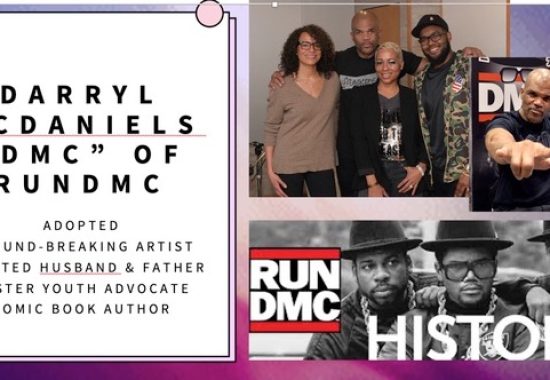contributed by Jennie Rosenstiel
Hip Hop turns 50 this year and when it comes to hip-hop’s influence on American music and culture, there are few names as celebrated as Darryl “DMC” McDaniels. Frontman to pioneering new-school hip-hop trio Run-DMC from 1983 until 2002, DMC is beloved to music fans worldwide. But when it comes to DMC, being a musical icon is only part of the story. He’s also a writer, activist, and advocate for adoptees and foster (and former foster) youth.
Born and raised in Hollis, Queens, NY, DMC grew up in a middle-class family and spent his days in Catholic schools. He was still in high school when he taught himself to DJ, a developing passion that would lead him to 3 platinum albums. Though he was bullied at school, DMC reflected that at home it “felt like Christmas every day.” That picture of the past became unimaginably complicated when DMC was researching his early life for his autobiography, King of Rock: Respect, Responsibility, and My Life with Run-DMC. It was then–at 35–that DMC learned of his own experience in foster care and ultimate adoption. As a late discovery adoptee, he has spent the better part of two decades grappling with the truth of his past and all of the many emotions and questions it brought up for him. But through therapy, building community with other adopted persons, and his art, DMC has worked hard to integrate his previously hidden truth.
In the years since learning of his adoption, DMC has joined with fellow adoptee and casting agent, Sheila Jaffe to form The Felix Organization, providing mentorship and summer camp experiences to foster youth. He’s become a voice for the rights of adoptees to access original birth certificates. He’s collaborated with fellow adoptee Sarah McLachlan on “Just Like Me.” And he’s authored even more books–a memoir entitled Ten Ways Not to Commit Suicide, children’s books including Darryl’s Dream, and multiple comic books.
Today, DMC is still making music, but his work as an advocate for adoptees and foster youth is arguably just as important. While no adoptee is obligated to disclose their trauma, DMC’s sensitive handling of his own past and present have turned an unknown history into an opportunity to help and inspire others. Through his art and activism, DMC has become one of the most important voices for adoptees and foster youth in America. DMC is a prolific and accomplished musician, writer, producer, and now comic book publisher. It’s difficult to imagine a better representative of the complexities inherent in the “lucky adoptee” narrative nor a more accomplished example of Black Excellence.
Darryl and his wife Zuri joined us (virtually) for camp in 2020.
For more, you can listen to a beautifully honest and nuanced conversation between DMC and our own April Dinwoodie from her podcast here.

